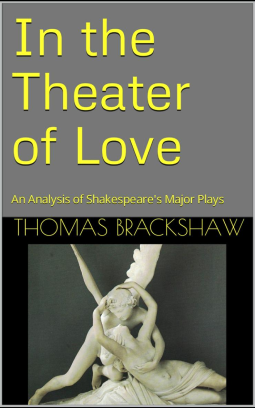
In the Theater of Love
An Analysis of Shakespeare's Major Plays
by Thomas Brackshaw
This title was previously available on NetGalley and is now archived.
Send NetGalley books directly to your Kindle or Kindle app
1
To read on a Kindle or Kindle app, please add kindle@netgalley.com as an approved email address to receive files in your Amazon account. Click here for step-by-step instructions.
2
Also find your Kindle email address within your Amazon account, and enter it here.
Pub Date Oct 25 2022 | Archive Date Dec 18 2022
Talking about this book? Use #IntheTheaterofLove #NetGalley. More hashtag tips!
Description
Shakespeare’s exposure to Ovid and other classical authors generated two minor epics and an abiding concern for the transforming power of erotic love.
While the changes endured by Ovid’s mortals are consistently described with a poignant mixture of sadness and beauty, Shakespeare’s appropriation of pagan mythology was necessarily complicated by an Elizabethan culture inescapably Christian. Keenly aware of the tension between a Christianity deeply suspicious of the flesh and a pagan literature that celebrated the erotic, his effort to synthesize those disparate attitudes becomes a driving force for his art.
Both Shakespeare and his audience would have accepted the postulate that love, including the erotic, was divinely provided to unite two individuals but that the erotic could also tempt us away from that purpose. Shakespeare quickly grasped the irony of a very natural desire leading some toward love, marriage, children, and family but deforming others to perpetrate the many species of evil plaguing the world.
Decisions have consequences. Despite human insight’s many limitations, mankind can still discern the difference between what is truly good and what isn’t by those consequences. With absolute precision, he anatomizes the process of temptation from one nature into the other, showing how reason and conscience are weak instruments easily subverted by an imagination susceptible to inaccurate perceptions.
Even though language proves wholly inadequate to correct those misconceptions, the world has been created to make the consequences of moral decisions clear, for disaster inevitably follows whenever consideration for self supersedes a spirit of generosity. This moral distinction constitutes a thread woven into the fabric of the plays and is based on a conception of love that includes the erotic but avoids its inherent dangers by incorporating an attitude of selfless generosity.
Such love is not an antidote to the world’s evil but exists more as an alternative to it. While the closed heart of selfishness is often a form of self-protection, the risk of extending love and mercy toward others, as Portia’s great speech on mercy reminds us, requires the same open-ended generosity that the Biblical God extended to mankind through His son.
At the heart of the Christian message, forgiveness is very much a generous act of love. Characters who exhibit this spirit of generosity may be vulnerable to those who seek advantage, but assuming the risk is the only available way to experience the fullness of life as it was intended.
Very often, Shakespeare’s women are the exemplars of that spirit, and only those men who exhibit a similar generosity toward others can respond fully to them.
Available Editions
| EDITION | Ebook |
| ISBN | 9781736752241 |
| PRICE | $0.00 (USD) |
| PAGES | 377 |



